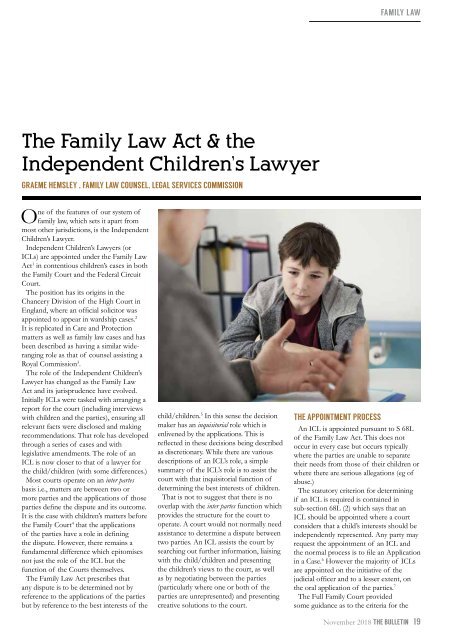LSB November 2018_Web
Create successful ePaper yourself
Turn your PDF publications into a flip-book with our unique Google optimized e-Paper software.
FAMILY LAW<br />
The Family Law Act & the<br />
Independent Children’s Lawyer<br />
GRAEME HEMSLEY , FAMILY LAW COUNSEL, LEGAL SERVICES COMMISSION<br />
One of the features of our system of<br />
family law, which sets it apart from<br />
most other jurisdictions, is the Independent<br />
Children’s Lawyer.<br />
Independent Children’s Lawyers (or<br />
ICLs) are appointed under the Family Law<br />
Act 1 in contentious children’s cases in both<br />
the Family Court and the Federal Circuit<br />
Court.<br />
The position has its origins in the<br />
Chancery Division of the High Court in<br />
England, where an official solicitor was<br />
appointed to appear in wardship cases. 2<br />
It is replicated in Care and Protection<br />
matters as well as family law cases and has<br />
been described as having a similar wideranging<br />
role as that of counsel assisting a<br />
Royal Commission 3 .<br />
The role of the Independent Children’s<br />
Lawyer has changed as the Family Law<br />
Act and its jurisprudence have evolved.<br />
Initially ICLs were tasked with arranging a<br />
report for the court (including interviews<br />
with children and the parties), ensuring all<br />
relevant facts were disclosed and making<br />
recommendations. That role has developed<br />
through a series of cases and with<br />
legislative amendments. The role of an<br />
ICL is now closer to that of a lawyer for<br />
the child/children (with some differences.)<br />
Most courts operate on an inter partes<br />
basis i.e., matters are between two or<br />
more parties and the applications of those<br />
parties define the dispute and its outcome.<br />
It is the case with children’s matters before<br />
the Family Court 4 that the applications<br />
of the parties have a role in defining<br />
the dispute. However, there remains a<br />
fundamental difference which epitomises<br />
not just the role of the ICL but the<br />
function of the Courts themselves.<br />
The Family Law Act prescribes that<br />
any dispute is to be determined not by<br />
reference to the applications of the parties<br />
but by reference to the best interests of the<br />
child/children. 5 In this sense the decision<br />
maker has an inquisitorial role which is<br />
enlivened by the applications. This is<br />
reflected in these decisions being described<br />
as discretionary. While there are various<br />
descriptions of an ICL’s role, a simple<br />
summary of the ICL’s role is to assist the<br />
court with that inquisitorial function of<br />
determining the best interests of children.<br />
That is not to suggest that there is no<br />
overlap with the inter partes function which<br />
provides the structure for the court to<br />
operate. A court would not normally need<br />
assistance to determine a dispute between<br />
two parties. An ICL assists the court by<br />
searching out further information, liaising<br />
with the child/children and presenting<br />
the children’s views to the court, as well<br />
as by negotiating between the parties<br />
(particularly where one or both of the<br />
parties are unrepresented) and presenting<br />
creative solutions to the court.<br />
THE APPOINTMENT PROCESS<br />
An ICL is appointed pursuant to S 68L<br />
of the Family Law Act. This does not<br />
occur in every case but occurs typically<br />
where the parties are unable to separate<br />
their needs from those of their children or<br />
where there are serious allegations (eg of<br />
abuse.)<br />
The statutory criterion for determining<br />
if an ICL is required is contained in<br />
sub-section 68L (2) which says that an<br />
ICL should be appointed where a court<br />
considers that a child’s interests should be<br />
independently represented. Any party may<br />
request the appointment of an ICL and<br />
the normal process is to file an Application<br />
in a Case. 6 However the majority of ICLs<br />
are appointed on the initiative of the<br />
judicial officer and to a lesser extent, on<br />
the oral application of the parties. 7<br />
The Full Family Court provided<br />
some guidance as to the criteria for the<br />
<strong>November</strong> <strong>2018</strong> THE BULLETIN 19


















